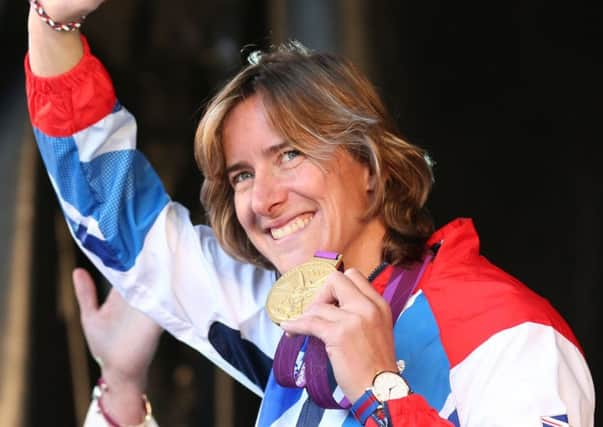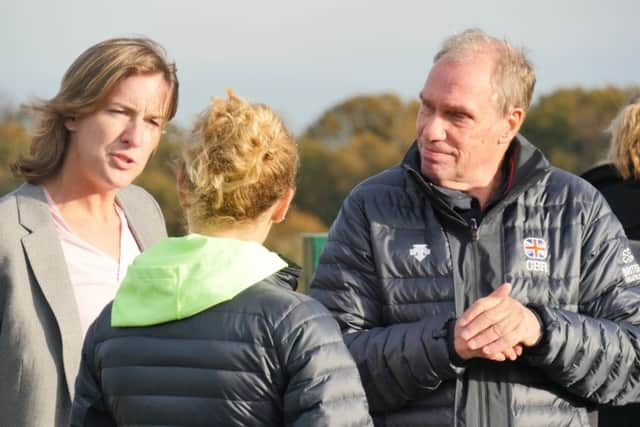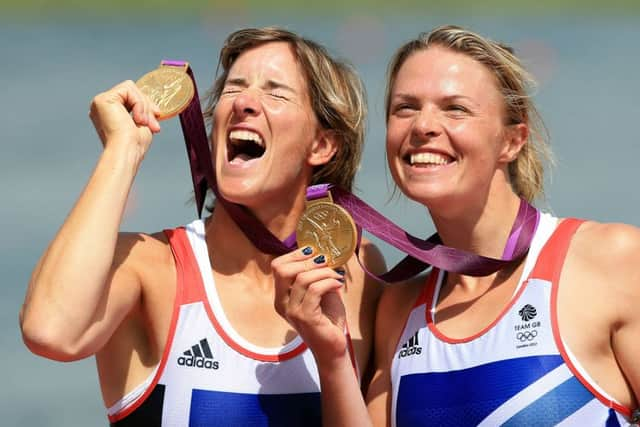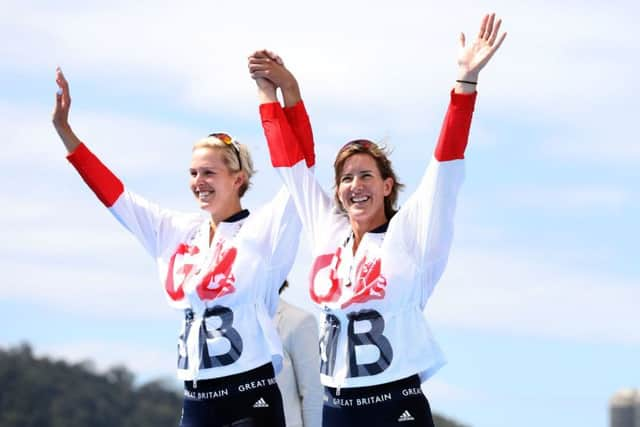Weekend Interview: Dame Katherine Grainger champions for equality in sport


Over her 20-year rowing career, the nation’s fortunes across the full spectrum of Olympic sports transformed from also rans to leaders of technological and training platforms that left the rest of the world playing catch-up.
Grainger has played her part, too, with five Olympic medals including an emotionally-charged gold at Eton Dorney during London 2012.
Advertisement
Hide AdAdvertisement
Hide AdWith such success, Grainger has become one of the most notable female figures in British sport and a pioneer for gender equality.


Since her retirement following the Rio Olympic Games – where she won silver in the double sculls alongside Vicky Thornley – Grainger has found herself elevated to new heights as the chair of UK Sport.
Life out of the boat has been very much life on the road for the 41-year-old, who has been touring sporting institutions to meet Britain’s best and next generation as the public face of a body determined to carry on creating eras of success, despite funding cuts.
Following record medal hauls at the previous two Olympics, Grainger knows expectation levels have risen following an era of sustained success.
Advertisement
Hide AdAdvertisement
Hide Ad“We obviously had a very successful Rio, which was even more successful than London which we thought was the pinnacle for all of us, now it’s the challenge to go forward yet again,” she said, during a tour of the newly-constructed Brownlee Triathlon Centre in Leeds.


“We are a year into the new Olympic cycle and we’re already ahead of where a lot of people expected. We are still three years out, there’s still a lot to be done and a lot to still be working on.
“The first year is often quite hard for returning athletes in terms of getting back to that routine and you’ve just had that massive peak. The first year is out of the way now and it feels like the momentum is in place all the way to Tokyo.”
Money, of course, has brought the biggest change in British sport.
Advertisement
Hide AdAdvertisement
Hide AdSince Grainger discovered rowing while reading for her degree at the University of Edinburgh back in 1993, the introduction of National Lottery funding has changed perspectives for athletes and created professionalism which has put Team GB on an even footing with others in the world.


Grainger was among that first generation catered for in the professional environment.
But now Britain’s most decorated female athlete has her fingers around the ladel of funding for sport, which caused controversy at the start of the year – before Grainger took office – after cutting the budget of 11 sports including badminton, fencing and basketball.
“It’s a very complex process,” added Grainger.
“We have more sports than ever being successful and the money isn’t going as far as it used to.


Advertisement
Hide AdAdvertisement
Hide Ad“All the sports that want the money, that love the money, that need the money, aren’t going to get it.
“So that’s an ongoing problem. Ideally we want as many of those athletes on the podium as possible in Tokyo.
“When I started last millennium, about 20 years ago, there was no lottery funding and there was no sort of national body. UK Sport didn’t exist when I started.
“Every athlete I knew, if they were lucky enough to get sponsored that was great. Most of them didn’t, most of them were having loans. There were no national facilities.
Advertisement
Hide AdAdvertisement
Hide Ad“Since then, the National Lottery has come in and the athletes that are funded can do it exclusively if they wanted. They can be full-time athletes, we had never had that before.
“We can get fully paid coaches, we can go training camps, we can get facilities, there’s loads of developments that have come in. Performances have gone up and expectation has risen with that. The public expects more. The pressure is greater and all sports are rising to meet that pressure. We have seen success growing every Olympics I have been involved.”


Key to UK Sport’s growth strategy has been the attitude towards women’s sport, an area, understandably, close to Grainger’s heart.
With four Olympic silver medals and that London gold, Grainger has been a leading figure in the development of women’s sport – and the success in it.
Advertisement
Hide AdAdvertisement
Hide Ad“Women’s sport has been absolutely transformed,” she added. “I see it when I go round schools and clubs, there are so many girls getting involved in so many sports. You can see that it will just keep progressing.
“One of the really important things, ever since we came in, the Lottery money goes out equally, it’s not gender biased in any way. It’s solely down to performance.
“In my sport, rowing, when the money came in it went equally between the men’s and women’s team. We have seen the rise.
“We had never had an Olympic medal in women’s rowing before the Sydney Olympics. We had the first one in Sydney and we’ve had medals ever since.
Advertisement
Hide AdAdvertisement
Hide Ad“London itself was seen as the women’s Games. Internationally, it was the first that every nation sent a woman’s representative and every sport had a female element to it because women’s boxing came in.
“From the British point of view, we have huge amounts of Olympic champions that are women. They shared the same room as the men and got equal coverage.”
In turn, however, the issue of women’s sports coverage remains prevalent.
Women’s Sport makes up just seven per cent of all sports media coverage in the UK with two per cent of national newspaper sports coverage dedicated to it; figures that have not altered since 2012. Grainger promised to lobby against the figures during her four-year term but knows the biggest challenge lies away from the traditional Olympic sports.
Advertisement
Hide AdAdvertisement
Hide Ad“If you look at the stats, the frustration will always be that if you pick up a newspaper to look at the sports pages, there’s only a tiny minority of the pages that will be on women’s sport – despite women’s sport being on all the time and every weekend,” said Grainger.
“You see it at the Olympics, it’s everywhere. People want to read about women’s sport as well as men’s sport. That’s something we can still improve on. Same in terms of sponsorship, but the more headlines women get, the more publicity they get, the more sponsorship they can attract and develop on all levels.
“Everyone is now aware of it. It’s an awareness that was necessary. We have made more people aware and they are reacting to it very positively.
“There are some very inspirational stories in terms of women’s sport that are now out there and people are very interested in them.
Advertisement
Hide AdAdvertisement
Hide Ad“You look at the sports that get the biggest column inches, it’s football, rugby, cricket. The big professional sports get the most coverage and it’s predominantly male dominated.
“We need to change that to change the whole picture.
“I don’t know when it will be equal. But we need to show the public have an appetite for women’s sport and then things will start to change.”